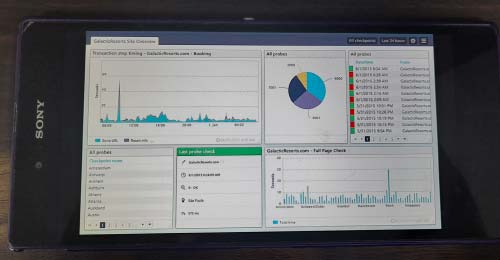Table of Contents
- » Uptime Website Monitoring
- Downtime Website Monitoring
- Server Ping Monitoring
What is Website Uptime Monitoring?
Website uptime monitoring is the process of regularly checking a website to ensure that it is available and accessible to users. This is typically done using automated tools that ping or send HTTP requests to the website at regular intervals. The tools then analyze the website's response to these requests to determine whether the website is up or down, and how long it takes for the website to respond.
Website uptime monitoring is a critical aspect of website management, as downtime can lead to lost revenue, decreased customer satisfaction, and damage to a brand's reputation. By monitoring a website's uptime, administrators can proactively identify and address any issues that may impact the site's availability and performance.
Why is Website Uptime Monitoring Important?

Website uptime monitoring is important for several reasons. The primary reason is that downtime can have a significant impact on a website's performance and availability. If a website is down, users will be unable to access the site, and the website's ranking in search engine results pages may be negatively impacted.
In addition to these issues, website downtime can lead to lost revenue for businesses. If a website is down for an extended period, potential customers may become frustrated and move on to a competitor's website, resulting in lost sales and revenue.
Website uptime monitoring can also help administrators identify and address issues that may impact the site's performance, such as slow load times or broken links. By addressing these issues proactively, administrators can improve the user experience and keep customers engaged with the website.
How Does Website Uptime Monitoring Work?
Website uptime monitoring works by using automated tools to regularly check a website's availability and performance. These tools typically send HTTP requests to the website at regular intervals, such as every minute or every five minutes. The website's response to these requests is then analyzed to determine whether the website is up or down, and how long it takes for the website to respond.
Some website uptime monitoring tools use multiple monitoring locations to ensure that the website is accessible from different geographic locations. This can help identify issues that may only impact users in certain regions, such as a localized internet outage.
In addition to monitoring uptime, some website monitoring tools also monitor other performance metrics, such as page load time, response time, and error rates. These metrics can provide administrators with valuable insights into how the website is performing and where improvements may be needed.
Benefits of monitoring website uptime
Monitoring website uptime is an essential task for any website owner or business. Website uptime refers to the amount of time that a website is available and functioning correctly for users to access it. Monitoring website uptime involves regularly checking if the website is accessible and available for users to access. In this article, we will discuss the benefits of monitoring website uptime.
-
⮚ Improve User Experience:
One of the primary benefits of monitoring website uptime is that it improves the user experience. When a website is down or not accessible, users cannot access the information or services they need. This can lead to frustration and dissatisfaction among users, resulting in a negative impact on the business's reputation. By monitoring website uptime, website owners can quickly identify and fix any issues, ensuring that the website is always available and accessible for users.
-
⮚ Prevent Revenue Loss:
Website downtime can result in significant revenue loss for businesses. For e-commerce businesses, website downtime can lead to lost sales, abandoned carts, and lost revenue. Even for businesses that do not directly sell products or services online, website downtime can lead to missed opportunities for lead generation. By monitoring website uptime, website owners can quickly identify and fix any issues, reducing the amount of revenue lost due to website downtime.
-
⮚ Improve SEO Rankings:
Search engine optimization (SEO) is an essential aspect of any online business's marketing strategy. Search engines such as Google and Bing consider website uptime as one of the ranking factors when determining search results. Websites that are frequently down or have poor uptime are less likely to appear in search results, resulting in lower traffic. By monitoring website uptime, website owners can improve their SEO rankings, resulting in more traffic and leads.
-
⮚ Identify Technical Issues:
Monitoring website uptime can help website owners identify technical issues that may affect the website's performance. Technical issues such as slow loading times, broken links, and server errors can negatively impact the user experience, lose the customer engagement and lead to lost revenue. By monitoring website uptime, website owners can identify these issues early and fix them before they negatively impact the website's performance.
-
⮚ Enhance Security:
Website uptime monitoring can also help enhance the website's security. Downtime can be caused by various security issues, such as DDoS attacks, malware infections, and hacking attempts. By monitoring website uptime, website owners can quickly identify any security issues and take appropriate action to secure the website, preventing any security breaches and protecting sensitive information.
-
⮚ Provide Insights:
Website uptime monitoring can also provide website owners with valuable insights into website performance. By tracking website uptime, website owners can identify trends and patterns that may impact website performance, such as peak traffic times and server load. This information can be used to make data-driven decisions to improve website performance and optimize website resources.

In conclusion, monitoring website uptime is a critical task for any website owner or business. The benefits of monitoring website uptime are numerous, including improving user experience, preventing revenue loss, improving SEO rankings, identifying technical issues, and enhancing security. By investing in website uptime monitoring, website owners can ensure that their website is always available and performing at its best, leading to increased revenue, customer satisfaction, and business success.
Benefits of Using a Website Uptime Monitoring Service
There are several benefits to using a website uptime monitoring service. The primary benefit is that it allows administrators to proactively identify and address issues that may impact the site's availability and performance. This can help prevent downtime and improve the user experience.
-
📈 Improved website performance:
By monitoring performance metrics such as page load time and response time, administrators can identify and address issues that may impact the website's performance.
-
👤 Increased customer satisfaction:
By ensuring that the website is always available and responsive to the customers, administrators can improve the customer satisfaction as well as retention.
-
🔒 Protection of brand reputation:
Downtime can damage a brand's reputation that results into poor revenue, especially if it occurs frequently. By monitoring uptime, administrators can prevent downtime and protect the brand's reputation.
-
📊 Improved search engine rankings:
Search engines prioritize websites that are fast and responsive. By monitoring performance metrics, administrators can improve the website's ranking in search engine results pages.